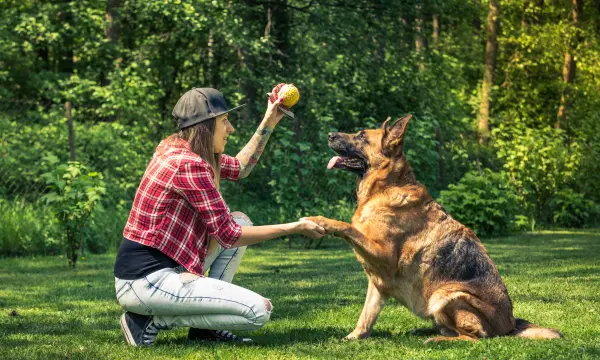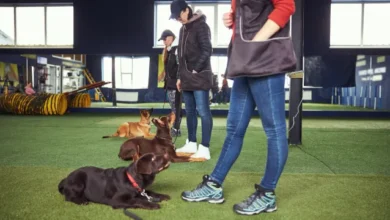
Dogs are revered as man’s best friend, but how often do people take out the time to understand and train them to behave properly? If you’ve been struggling with your pawed pal’s skills or behavior, it’s time to go professional. As it turns out, professional dog training can change both your and your pet’s life in ways you might not have anticipated.
Have you ever looked into the world-class skills offered by Flash Dog Training in Broomfield CO? It might hold the solution to all your canine-related woes.
Importance of Professional Dog Training
Handling a pet isn’t always easy, particularly if that furry friend is a dog known for its stubbornness and hyperactivity. That’s where professional dog training weighs in. Unlike DIY tricks and tips, professional dog training addresses a spectrum of behavioral issues accurately and efficiently so that your four-legged buddy learns essential life skills and manners.
It also ensures a safe environment. Trainers employ methods that don’t harm or disturb the mental peace of your dog. Moreover, professional training also strengthens the bond between you and your furry friend. When you understand your little pupper better through professional guidance, trust inevitably flourishes.
Different Techniques in Dog Training
Just like humans learn differently, so do dogs! Every dog has unique learning needs, which is where professional dog training gains an edge over generalized techniques.
Experts use several techniques, including clicker training, positive reinforcement, electronic training, mirror training, dominance, and more. Among these, clicker and positive reinforcement techniques are common. The clicker technique employs a tiny device that clicks to signal desirable behavior while positive reinforcement is about rewarding good behavior.
Electronic and mirror training methods may be used for certain breeds or particular types of training. Electronic training uses minimal electric shock as feedback for inappropriate behavior while mirror training is about letting one dog follow the good behavior of another.
The dominance technique involves asserting the owner’s dominance to set a hierarchy. The right technique is effectively chosen according to the dog’s breed, age, temperament and learning style.
Choosing the Right Dog Trainer
Picking out the perfect trainer for your canine companion isn’t child’s play. You need a professional who can blend strictness with compassion and patience.
The certification from Association of Professional Dog Trainers (APDT) is a good benchmark to check. Teachers with APDT certification are acknowledged professionals in the industry. An experienced trainer should also be well-versed in multiple training styles to cater to diversified needs.
You may want to look into their track record to measure success rates. Client testimonials can further provide insights into their professionalism and approach.
Finally, it’s important that your dog also feels comfortable with the trainer; after all, they will be spending quality time together!
Role of Positive Reinforcement
Positive reinforcement has a significant role in shaping your dog’s habits. It advocates for rewarding appropriate behaviors while ignoring negative traits. Essentially, it taps into your dog’s drive to make associations between actions and rewards thereby encouraging good conduct in the long run.
The rewarding behavior must be immediate and frequent initially until the behavior is learned in entirety. The reward system can gradually be phased out later, leading your dog to respond obediently without the prospect of a treat.
Starting positive reinforcement early can yield excellent results. However, consistency is key! Inconsistent rewards might confuse your dog, ultimately impairing his learning ability.
While this technique can be used at home, professionals hold the key to maximizing its potential through strategic reward placement and scheduling.
Addressing Behavioral Issues
Does your dog incur behavioral problems, or do you know of dogs who do? Problems such as excessive barking, digging, chewing and anxiety are common among dogs.
One misconception is that these behaviors are unchangeable. Regardless of how tricky they may seem, professional training can indeed help address them significantly. The process entails identifying the problem’s root cause and tailor-making a solution based on that.
Apart from common ones, professionals can also tackle complex issues like aggression or mood swings caused by trauma or past experiences. These usually entail intense therapy sessions with a skilled professional.
Remember that patience is crucial when dealing with behavioral issues! It’s not the dog’s fault—it’s their untamed natural instincts or unfortunate past experiences at work. Given time and consistent professional training, any dog can become an obedient and loving companion!
Puppy Training Essentials
Training your puppy is one of the first steps to ensuring a happy and healthy life for both you and your canine companion. This phase lays the foundation for proving that your commands are worth following, making all other training much easier down the line.
Taking on this task can be overwhelming due to their boundless energy and thirst for exploration. Consistency is essential during this period, and you may find the support of a professional extremely useful.
Remember that socialization is an integral part of puppy training. The American Veterinary Society of Animal Behaviour (AVSAB) encourages early socialization by exposing them to a variety of environments, people, and other animals. This helps puppies develop into well-mannered adults.
Next in line is house training or potty training. For success in this area, setting up a regular eating schedule and providing opportunities to relieve themselves outdoors can play a prominent role.
Advanced Training For Dogs
Moving on to advanced training techniques allows dogs to engage in skillful obedience tasks or even specific job-oriented activities. Advanced dog training includes schooling in tasks like heelwork, recall off-lead, distance control and more.
This level of training might require trainers with certain qualifications. Always consult professionals who have experience with advanced training methods. Do the groundwork and ensure the trainer aligns with your ethical and humane training perspectives.
An important aspect of advanced training is problem-solving. It encourages your pet to think and make decisions on its own. Activities such as treasure hunts, interactive toys, puzzles keep them mentally engaged and challenged.
Task-oriented training can be fulfilling for certain breeds. Border Collies or German Shepherds might enjoy tasks such as herding, search-&-rescue, or agility competitions. Advanced obedience training can cater to these needs while providing a constructive outlet for their energy.
Specialized Training: Service and Therapy
Service dogs and therapy dogs receive special training due to the nature of their roles. They assist humans with disabilities or act as emotional support animals for people seeking therapeutic benefits.
Service dogs require professional training from a young age. Their duties are critical, including guiding visually impaired individuals, alerting deaf people to sounds, retrieving items, pulling a wheelchair, activating life-saving mechanisms, etc. This specialized training obliges an excellent understanding of task-specific commands.
On the other hand, therapy dogs provide comfort to humans in various settings like hospitals, nursing homes, schools, airports etc. These dogs undergo professional obedient training but also need to display certain traits like enjoying human contact and being gentle in every encounter.
Being aware of your pet’s potential and seeking specialized training could change multiple lives positively. These wonderful pets literally save lives every day because of their effective training regimes.
The Final Words
Effective professional dog training isn’t just about commands and cues; it’s about creating a harmonious relationship between you and your furry friend. With patience, consistency, and the right choice of trainer, you can create a bond that’s built on understanding, trust, and mutual respect. Remember – this is not merely about changing behavior, but more about enhancing life quality for you and your pawed pal!



